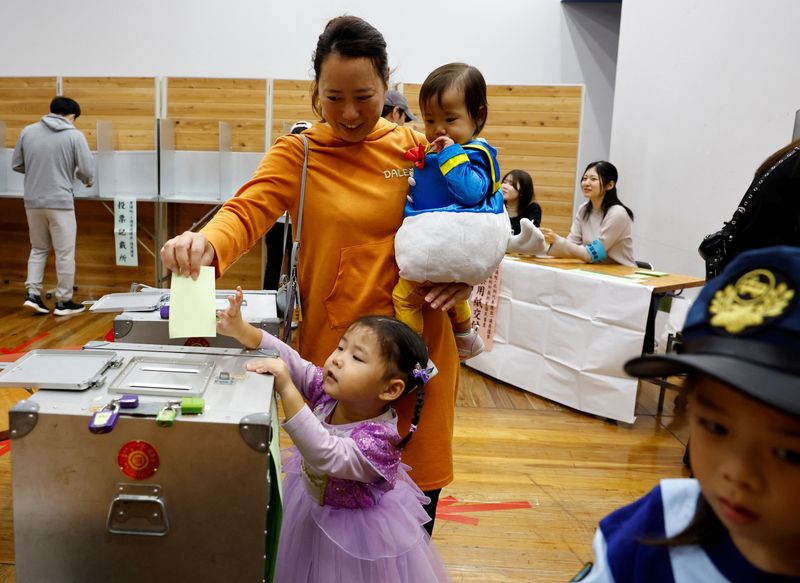By Sakura Murakami and Irene Wang
TOKYO (Reuters) -Japan’s voters determine the destiny of Prime Minister Shigeru Ishiba’s authorities on Sunday in an election anticipated to punish his coalition over a funding scandal and inflation, probably ending a decade of dominance for his Liberal Democratic Occasion.
The LDP and its longtime companion Komeito will undergo a drubbing from voters, with the coalition probably shedding its parliamentary majority, opinion polls recommend, as Japan struggles with rising prices of residing and more and more tense relations with neighbouring China.
Shedding the bulk within the decrease home would pressure Ishiba, in workplace only a month, into power-sharing negotiations with smaller events, bringing uncertainty in some coverage areas, though no polls forecast the LDP being ejected from energy.
Political wrangling may roil markets and be a headache for the Financial institution of Japan, if Ishiba chooses a companion that favours sustaining near-zero rates of interest when the central financial institution needs to regularly elevate them.
“He’ll be considerably weakened as a leader, his party will be weakened in the policies that it particularly wants to focus on, because bringing in a coalition partner will cause them to have to make certain compromises with that party, whatever party it may be,” mentioned Jeffrey Corridor, an skilled on Japanese politics on the Kanda College of Worldwide Research.
The LDP may lose as many as 50 of its 247 seats within the decrease home and Komeito may slip under 30, giving the coalition fewer than the 233 wanted for a majority, a survey by the Asahi newspaper prompt final week.
“That’s basically the scenario for ‘sell Japan’,” as traders ponder how the end result may have an effect on fiscal and financial coverage, mentioned Naka Matsuzawa, chief macro strategist at Nomura Securities. Japanese shares fell 2.7% final week on the benchmark index.
The LDP will stay the largest pressure in parliament, polls point out, nevertheless it may lose many votes to the quantity two get together, the opposition Constitutional Democratic Occasion of Japan, which toppled the LDP in 2009, the Asahi mentioned, estimating the CDPJ may win as many as 140 seats.
COALITION HEADACHES
9 days earlier than U.S. voters select a brand new president, Japan’s common election seems prone to present Ishiba miscalculated in going to the voters for a verdict on the LDP’s scandal over unrecorded donations at fundraisers.
After purging some LDP members, Ishiba says he considers the case closed and has not dominated out giving authorities posts to disgraced politicians, probably angering voters, specialists say.
Potential coalition companions could possibly be the Democratic Occasion for the Individuals (DPP) and the Japan Innovation Occasion, however each suggest insurance policies at odds with the LDP line.
The DPP requires halving Japan’s 10% gross sales tax till actual wages rise, a coverage not endorsed by the LDP, whereas the Innovation Occasion has pledged harder donation guidelines to scrub up politics.
The Innovation Occasion opposes additional fee hikes, and the DPP chief has mentioned the central financial institution might have been hasty in elevating charges, whereas the BOJ needs to regularly wean the world’s fourth-largest economic system off a long time of financial stimulus.
“The DPP is focused on ultimately making the country better and ensuring financial resources are allocated more appropriately, so that’s why I decided to vote for them,” Keisuke Yoshitomi, a 39-year-old workplace employee mentioned after casting his vote at a polling station in central Tokyo on Sunday.
Additionally voting on the identical station on a sunny morning, Takeshi Ito, a 38-year-old supervisor at an infrastructure firm mentioned he would stick to the LDP, which has ruled Japan for nearly the entire post-war period.
“Even if I were to switch to an opposition party, it’s still unclear whether they could push forward reforms, and I don’t know if I can trust them or not at this point,” Ito mentioned.
“Therefore, I want to see the party that has been in power continue to move forward.”

Virtually 40% of voters say their prime concern is the economic system and value of residing, in line with a ballot by public broadcaster NHK. It discovered 28% need a tax minimize and 21% hoped to see a continued rise of their wages.
Varied events have pledged to boost wages in a transfer that will win votes but additionally threatens smaller companies which are struggling to maintain up with rising prices.




